<< Previous | Displaying results 441-450 of 489 for "warsaw" | Next >>
Hannah was one of six children born to Yiddish-speaking, religious Jewish parents in the town of Zvolen in central Poland. She married Jozef Rosenblat, a Jewish shoemaker also from Zvolen. After living in Warsaw for several years, Hannah and Jozef settled in the industrial city of Radom near their hometown. There, they raised their three sons. 1933-39: When Germany threatened to attack Poland in August 1939, Hannah's youngest son, Herschel, was called up by the Polish army. On September 1, 1939, Germany…
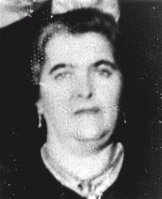
Elya, also known as Eli, was the eldest of three sons born to Yiddish-speaking Jewish parents. When Elya was a child his family moved to the industrial city of Radom, located about 60 miles south of Warsaw. After completing school in Radom, Elya apprenticed to become a women's tailor. Eventually, he became licensed as a master tailor. 1933-39: Elya married in 1936 and had a daughter one year later. He and his wife lived on Zeromskiego Street across from Elya's younger brother, Itzik, who was also a…
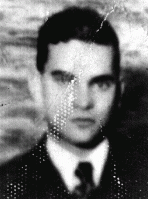
Bernburg was the fifth of six centralized killing centers established by German authorities within the context of the Nazi “euthanasia,” or T4, program.
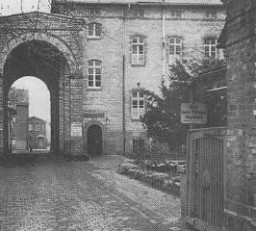
Like other Jews, the Lewents were confined to the Warsaw ghetto. In 1942, as Abraham hid in a crawl space, the Germans seized his mother and sisters in a raid. They perished. He was deployed for forced labor nearby, but escaped to return to his father in the ghetto. In 1943, the two were deported to Majdanek, where Abraham's father died. Abraham later was sent to Skarzysko, Buchenwald, Schlieben, Bisingen, and Dachau. US troops liberated Abraham as the Germans evacuated prisoners.
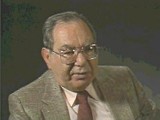
Helen was the oldest of three sisters. Her father owned a soap factory. After the Germans attacked Poland in 1939, they took over all Jewish businesses. Helen and her family fled from Lodz to a town between Lodz and Warsaw. After two years, in 1942, Helen's father heard that the Jews in the town to which they had fled were to be deported to labor camps. He bought false papers for Helen and her youngest sister. All three sisters survived the war.
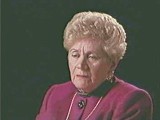
Ludmilla was born to an assimilated Jewish family in Kishinev, Romania. She and her mother, a physician, were living in Poland when the Germans invaded on September 1, 1939. They were taken to Krakow. Ludmilla was forced to live in the Krakow ghetto; her mother was sent to the Warsaw ghetto. Ludmilla worked in a factory at the Plaszow labor camp for a businessman who was a friend of the German industrialist Oskar Schindler. In October 1944, Schindler attempted to save some Jewish workers by relocating them…
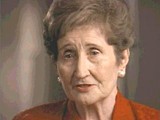
Like other Jews, the Lewents were confined to the Warsaw ghetto. In 1942, as Abraham hid in a crawl space, the Germans seized his mother and sisters in a raid. They perished. He was deployed for forced labor nearby, but escaped to return to his father in the ghetto. In 1943, the two were deported to Majdanek, where Abraham's father died. Abraham later was sent to Skarzysko, Buchenwald, Schlieben, Bisingen, and Dachau. US troops liberated Abraham as the Germans evacuated prisoners.
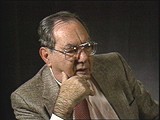
Like other Jews, the Lewents were confined to the Warsaw ghetto. In 1942, as Abraham hid in a crawl space, the Germans seized his mother and sisters in a raid. They perished. He was deployed for forced labor nearby, but escaped to return to his father in the ghetto. In 1943, the two were deported to Majdanek, where Abraham's father died. Abraham later was sent to Skarzysko, Buchenwald, Schlieben, Bisingen, and Dachau. US troops liberated Abraham as the Germans evacuated prisoners.
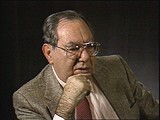
Ludmilla was born to an assimilated Jewish family in Kishinev, Romania. She and her mother, a physician, were living in Poland when the Germans invaded on September 1, 1939. They were taken to Krakow. Ludmilla was forced to live in the Krakow ghetto; her mother was sent to the Warsaw ghetto. Ludmilla worked in a factory at the Plaszow labor camp for a businessman who was a friend of the German industrialist Oskar Schindler. In October 1944, Schindler attempted to save some Jewish workers by relocating them…
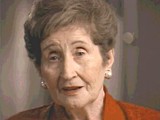
Ludmilla was born to an assimilated Jewish family in Kishinev, Romania. She and her mother, a physician, were living in Poland when the Germans invaded on September 1, 1939. They were taken to Krakow. Ludmilla was forced to live in the Krakow ghetto; her mother was sent to the Warsaw ghetto. Ludmilla worked in a factory at the Plaszow labor camp for a businessman who was a friend of the German industrialist Oskar Schindler. In October 1944, Schindler attempted to save some Jewish workers by relocating them…
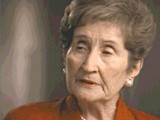
We would like to thank Crown Family Philanthropies, Abe and Ida Cooper Foundation, the Claims Conference, EVZ, and BMF for supporting the ongoing work to create content and resources for the Holocaust Encyclopedia. View the list of donor acknowledgement.